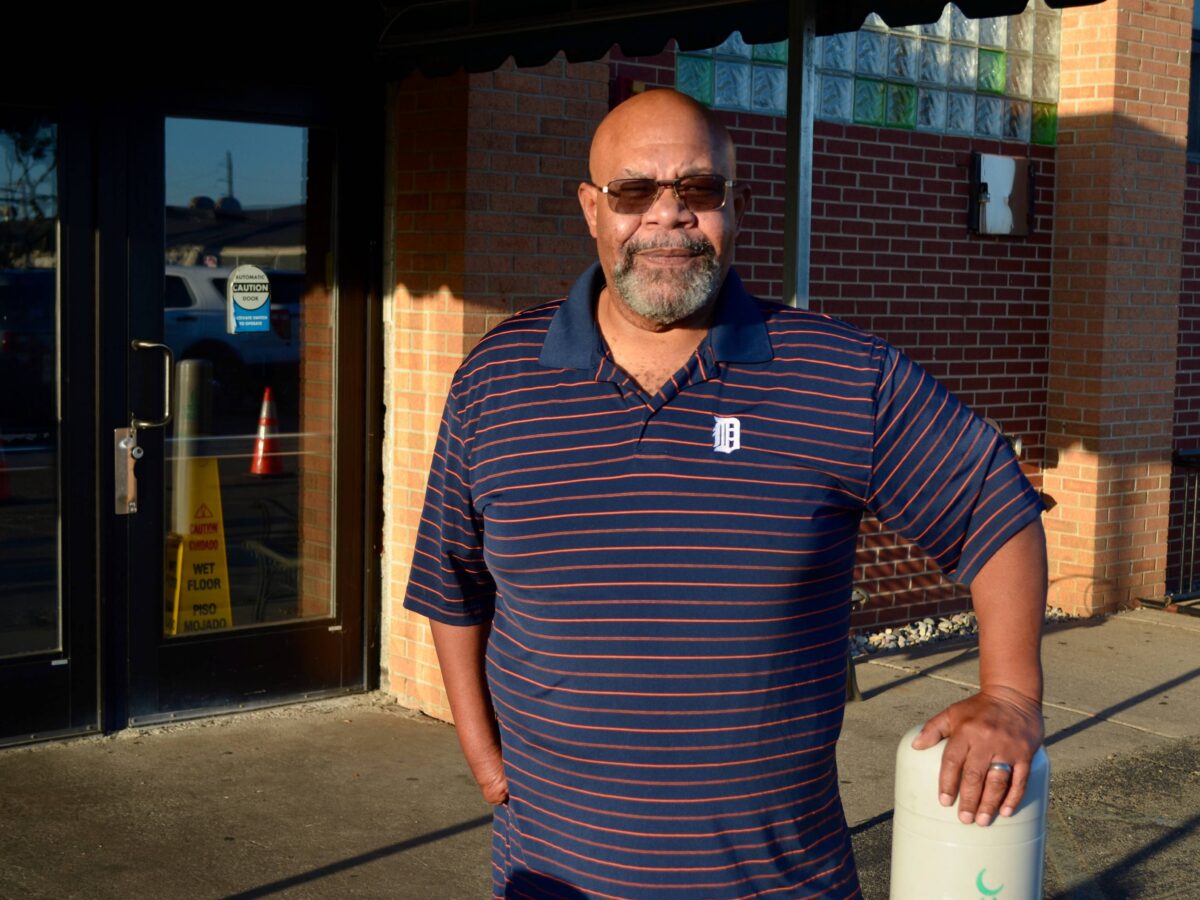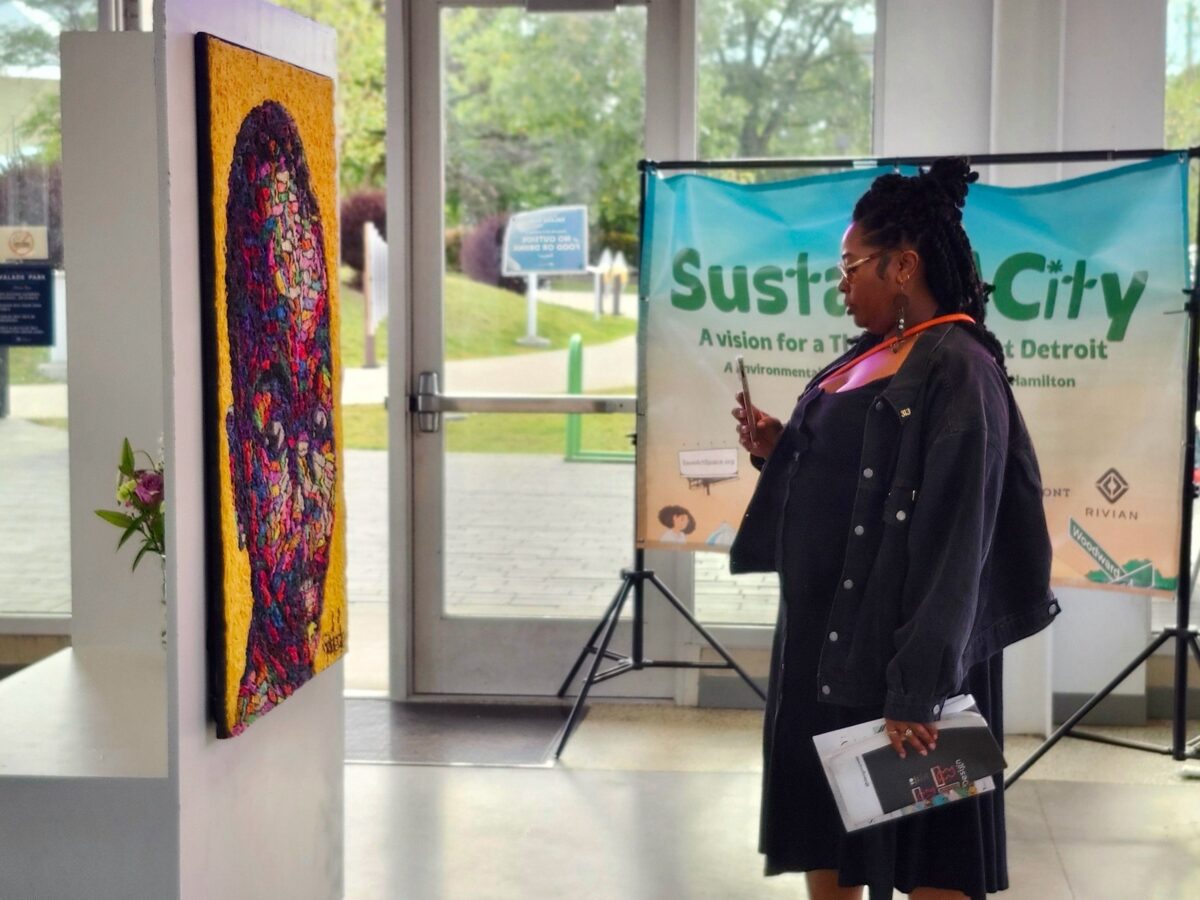Overview:
- Erik Shelley was born to an interracial couple in 1966, one year before the Supreme Court lifted a ban on such unions.
- Shelley fasted until the late U.S. Rep. John Conyers would meet with him to discuss impeachment of President George W. Bush.
- More recently, he pressured Marathon Petroleum to offer home buyouts near its Detroit refinery.
When Erik William Shelley was a child, his mother gave him a poster of the U.S. Constitution. A cartoon illustrated each of the Bill of Rights.
Seeing the poster every day gave Shelley a deep appreciation for the principles it represented, he said.
Shelley always viewed politics as a spectator sport — something you watched on television, but didn’t participate in. Toward the end of George W. Bush’s presidency, that all changed.
He said witnessing the country enter into two wars was troubling enough, but hearing about the torture and denial of rights to prisoners at Abu Ghraib deeply disturbed him. Little did he know his righteous indignation would set him on a path of self-actualization.
Shelley’s political turning point
Born in 1966 in Detroit, Shelley is the product of an interracial marriage, one year before the Supreme Court lifted the ban on such unions. His father, William Shelley, was African American, and his mother, Karen Nelson, was Norwegian; both were educators.
His mother, skeptical of the public school system, enrolled him at Taproot Elementary, an experimental Detroit school where children were grouped into clubs rather than grades. He recalls it as a great experience — noncompetitive and nonjudgmental.
That changed in 1978, when the family moved to Southfield and he entered the public school system, a transition he still finds unsettling.
Shelley graduated from Southfield High School in 1984 and went on to attend Morehouse College in Atlanta, Georgia, an experience he said was marred by colorism, sexism, and classism he observed on campus. That disillusionment helped shape his growing commitment to social justice, he said.
He returned to Michigan and enrolled in Oakland Community College, where he discovered a love for audio and radio production. He later attended Central Michigan University, graduating in 1991 with a degree in broadcasting and cinematic arts.
Over the next decade, Shelley worked a variety of media jobs—from an all-news radio station to running sound for a blues musician. While he’s long been fascinated with the Constitution, he says he can’t pinpoint exactly the start of his passion for social justice.
A turning point came after he attended an anti-war rally in Washington, D.C., where actor Tim Robbins gave a speech condemning the war in Iraq, Shelley said. Surrounded by chanting protesters, Shelley had what he calls his moment of radicalization.
‘An innovative and inspiring colleague’
Shelley joined Code Pink, an anti-war group that organized a 40-day fast calling for the impeachment of President Bush.
Determined to hold those in power accountable, Shelley sought a meeting with the late U.S. Rep. John Conyers, whose office was located in downtown Detroit. For 30 consecutive days, he said he visited the congressman’s office, making it clear that he was fasting until he was granted a meeting.
Eventually, Conyers agreed to meet with him at the UAW hall in Dearborn.
Those who have worked with Shelley say this kind of dedication is typical.
Emma Lockridge, former environmental justice organizer with Michigan United, said: “I targeted a company with headquarters outside Michigan. Erik jumped in his car and drove there to research how best to impact the corporation.”
Although Shelley’s meeting with Conyers was amicable, no action was taken toward impeachment. The congressman explained that Republican cooperation was necessary, as the party controlled Congress, Shelley said.
Undeterred, Shelley tried to meet with GOP U.S. Rep. Thaddeus McCotter. When that failed, he ran against McCotter on the Green Party ticket in 2008, hoping the election would prompt a meeting. It didn’t.
Two years later, Shelley became involved in the Occupy Wall Street movement. He visited the Occupy encampment in Detroit’s Grand Circus Park, where he met Bartosz Kumor of the Michigan Organizing Project. Shelley describes Kumor as a “super organizer” with a gift for identifying people’s strengths and putting them to use.
At the time, the group’s focus was eviction defense as foreclosures swept through Michigan. Eventually, the Michigan Organizing Project merged with the Alliance for Immigrant Rights to form Michigan United, where Shelley became the communications director.
His role went far beyond press releases and press conferences, he said. Shelley led direct actions: often-theatrical demonstrations designed to pressure policymakers and spark media attention.
Co-worker Elouise Sirleaf said Shelly “is an innovative and inspiring colleague whose work brings imagination to life.”
MORE FROM THE NEIGHBORHOOD REPORTING LAB
Detroiters describe citywide struggle with truck traffic: ‘Our streets are sinking’
Children living within two blocks of I-75 have asthma rates 25% to 42% higher than those living further away from major roads, says Detroit Hispanic Development Corporation’s Rachel Marquez.
How one Detroit farmer tackles water access: ‘The plants will be watered fully and consistently’
Farmers in Michigan and across the Midwest are turning to hoop houses as a low-cost way to extend the growing season and protect crops.
Sustain-A-City: Detroit reimagines sustainability through art
Detroit’s creative spirit intersects with environmental advocacy for “Sustain-A-City: A Vision for a Thriving, Resilient Detroit.” The art is showcased on billboards through Sept. 14.
Marathon refinery a case study in Shelley’s activism
One direct action that stands out for Shelley involves Marathon Petroleum’s refinery in Southwest Detroit.
In 2012, Marathon offered above-market prices to buy homes in the predominantly white neighborhood of Oakwood Heights to make way for a refinery expansion, as reported in Metro Times.
Residents in the neighboring, majority Black Boynton community received no such offers. In 2017, the community protested, holding signs that read “Buy more houses,” Metro Times reported.
To escalate the pressure, Shelley arranged for his organization to purchase one share of Marathon stock, allowing its proxy, organizer Lockridge, access to the shareholders’ meeting in Findlay, Ohio.
While Lockridge addressed shareholders inside, Shelley coordinated a “blind picket” outside: activists positioned at multiple intersections with signs accusing Marathon of endangering residents’ lives with toxic fumes.
The picketers moved strategically so they couldn’t be stopped, ensuring that anyone attending the meeting saw the protest, Shelley said.
The action created such a stir that Marathon’s CEO agreed to negotiate with Lockridge regarding the purchase of more homes, he said.
Lockridge reflected on Shelley’s impact: “When I think of justice organizing and Erik, a few words come to mind. He’s brilliant, empathetic, compassionate, creative, kind, loving, and someone you want on your side.”






